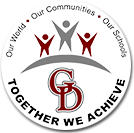After multiple years of planning and refining a curriculum for a new independent experience, 48-students at Groton-Dunstable Regional High School (GDRHS) are now enrolled in an interdisciplinary course called Sustainable Living. Faculty members Erika Gounis, from the English Language Arts Department, and Elise Reid, from the Science Department, are guiding their students, mostly seniors, through a half-year exploration of sustainable philosophies and practices to teach students how to be responsible consumers and producers in their communities and beyond.
Students brainstorm sustainability issues in a project-based environment supporting self-directed learning and problem-solving during the first phase of the course. Each week, students work in both independent and collaborative environments with peers and teachers on topics such as conditions required for growing crops and the sustainable nature of animal-based food.
Through a great deal of planning and passion, Gounis and Reid have developed this course with student-driven objectives and a set of standards centered around academic and community-inspired purposes. Gounis and Reid were awarded a GDEF Foundation Grant for equipment needed for maintaining the high school garden and worked with Ed Sablock, the Director of Buildings and Grounds, to identify additional locations to be supported by students in the course. There was also a donation of heirloom seeds, which will allow students to experiment on effective ways to grow vegetables into seedlings. With spring around the corner, students will transport their seedlings outside with an opportunity to harvest the crops this fall.
Both Gounis and Reid see this course as offering an inclusive learning environment, in support of activities and lessons that are applicable in all student’s lives. As a goal of the course, Gounis shared, “[we want] to give students the tools and information they need to start making sustainable changes in their lives right now and to develop habits that will carry into their futures and into the world they live in.” Gounis continued, “through tackling real challenges and obstacles as we work through the process of creating and maintaining green spaces around our campus, students will develop problem-solving skills and an appreciation for the natural world that we hope will last a lifetime.”
During the final term, students will conceptualize, plan, and implement a Legacy Project, which contributes to the sustainability of GDRHS both now and in the future. This hands-on independent experience will be student-driven and will require self-direction, self-motivation, research, and time management skills.
For some students, this new academic experience aligns well with learner variability. With his academic career winding down at GDRHS, senior Shawn Wright is finding a perfect match within the Sustainable Living course and is finding the coursework intriguing, to say the least. “This class is probably one of the most important classes I have,” Wright shared. “I like to be hands-on with what I do, and therefore I think this class is perfect for me.”
Results from the course are being applied much sooner than a final project in June, as students are already looking for ways to improve the high school campus by reducing litter and discussing ideas on transportation with less of an impact on our environment.
Madison Donahue, a senior, has always wanted to learn about growing food locally and is enjoying making connections with her peers. “I absolutely love sustainable living. The class has taught me how to think about ways to make my everyday habits better for the environment,” said Donahue. “I’ve gotten to work with and reconnect with so many of my classmates and share ideas and opinions about the challenges we are faced within the class as well as the community.”
As the class continues to progress, please check back for future updates on the success of this course. Students like sophomore Sam Champey are excited for the spring, sharing that he is “looking forward to starting our community garden…this class is helping me learn about the environment and how I can help make it better.”

